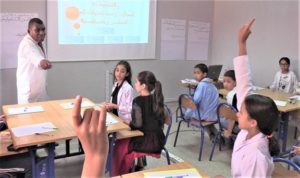New curriculum strengthens literacy alongside climate awareness in Morocco
By Daniel Lynx Bernard
A project supported by the United States to strengthen literacy in primary schools in Morocco is also providing new opportunities to teach children about climate change and other urgent environmental challenges. While revamping Morocco’s curriculum for teaching young children to read and write in Arabic, the Reading for Success–National Program for Reading (NPR) added units to familiarize children in first through sixth grade with global warming, water pollution, threats facing forests and oceans, and energy conservation.

As the curriculum strengthens skills in reading, writing, and speech through audio, text, and participatory learning, the units provide compelling topics that help students consider their own relationships with water, forests, wildlife, and energy use. The units culminate in a project that makes students feel personally engaged with seeking solutions.
At Al-Resala Primary School in Ait Melloul, sixth-graders’ hands darted up as their teacher, Hamid Ait Barka, explained the requirements for their project on global environmental challenges such as climate change and pollution. Ait Barka said students have connected personally with the environmental content. “The students’ interaction was very positive because of the importance of the topic and through their sense of the dangers threatening the environment,” Ait Barka said.
After Ait Barka taught a new lesson on waste management, 11-year-old student Yasmina Sayeh submitted a project describing how to repurpose waste items for further use. The experience gave Yasmina a greater sense of her accountability for protecting nature and a feeling of empowerment, her mother Samia El Hirech said. “In the beginning, my daughter didn’t know the meaning of recycling,” El Hirech said. “She learned that we could produce perfect and valuable things from used items. Now she knows that recycling can help us in our daily life and is beneficial for preserving nature, and it enhances our sense of responsibility in maintaining nature.”
As an educator, Ait Barka said he was energized to work with the urgently relevant material. “This type of teaching puts teachers at the heart of life problems,” he said. “The new curriculum provides the right setting with all of the resources – reading, oral, and written expression, in addition to unit projects.”
In the coastal city of Inezgane, climate awareness is also at the heart of learning. Third-grade teacher Nadia Rochdi used the new instructional material to show her students that taking care of their local surroundings is a microcosm of caring for the natural environment. Rochdi used the materials for hands-on learning as her students cared for plants, painted pictures about the environment, and staged a play and an art exhibit. “The new curriculum contains different activities that raise students’ awareness of the importance of preserving the environment. This reflects positively in their behavior and the way they interact with it,” Rochdi said. “I am happy about that and wish that the Ministry would duplicate its efforts regarding this important topic, especially with all the challenges and the climate changes of our planet.”
The NPR project, which launched in 2017 and is set to be completed in 2022, is supported by the U.S. Agency for International Development (USAID), in cooperation with Morocco’s Ministry of National Education with technical assistance from Creative Associates International.
Mounya El-Asri contributed to this article.

